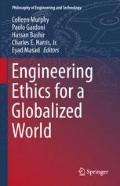Abstract
Two key challenges haunt ethics teaching: relevance and universalism. Demands for relevance, whether relevance is judged based upon association to a local standard (e.g., national professional association code) or to the specific demands of a professional workplace, pull the teaching and study of ethics towards the particular. Calls for a global standard pull ethics teaching and scholarship toward high level principles that can be difficult to justify at a level students and grants funding agencies find applicable. Particularity and specificity complicate demands for global standards or universal norms, while exposition at a universalized level frustrate application in a relevant context. This chapter investigates the structure of research ethics as exemplified in the Singapore Statement, then turns to a case study of RCR students in Hong Kong to provide an example of RCR receptivity among students in engineering and other fields.
Access this chapter
Tax calculation will be finalised at checkout
Purchases are for personal use only
Notes
- 1.
Although other regulatory regimes may also be relevant, U.S. regulations play an important role in higher education across borders. The policies regarding research integrity found in the US Federal Wide Assurance, for instance, tends towards a globalization of U.S. regulations in the area of research.
- 2.
For a fuller discussion, see Jordan with Gray (2013).
- 3.
This research was funded in part by a grant from the Office of the Vice-Chancellor for Research at the University of Hong Kong.
- 4.
The Human Subjects Ethics Committee for Non-Clinical Faculties of the University of Hong Kong approved this project under an expedited review with a waiver of documentation of written informed consent. The full survey instrument is reprinted in Gray and Jordan 2012: 309–310.
- 5.
- 6.
For an examination of different cultural norms as they influence professional ethics – in this case, the civil service – cf. Jordan and Gray 2011.
References
American Society of Civil Engineers (2013). Code of ethics. Available at: http://www.asce.org/Ethics/Code-of-Ethics/. Accessed 3 July 2013.
Committee on Science, Engineering and Public Policy. (1998). On being a scientist: Responsible conduct of research (2nd ed.). Washington, DC: National Academic Press.
Emanuel, E. J., Grady, C., Crouch, R. A., Lie, R. K., Miller, F. G., & Wendler, D. (Eds.). (2008). The Oxford textbook of clinical research ethics. Oxford: Oxford University Press.
Gawande, A. (2007). Better: A surgeon’s notes on performance. New York: Picador.
Gray, P. W., & Jordan, S. R. (2012). Supervisors and academic integrity: Supervisors as exemplars and mentors. Journal of Academic Ethics, 10(4), 299–311.
Haggerty, K. D. (2004). Ethics creep: Governing social science research in the name of ethics. Qualitative Sociology, 27(4), 391–414.
Harris, C. E., Pritchard, M. S., & Rabins, M. J. (2009). Engineering ethics: Concepts and cases (4th ed.). Belmont: Wadsworth.
IEEE. (2013). IEEE code of ethics. http://www.ieee.org/about/corporate/governance/p7-8.html. Accessed 3 July 2013.
Israel, M., & Hay, I. (2006). Research ethics for social scientists. London: Sage.
Jordan, S. R., & Gray, P. W. (2011). The ethics of public administration: The challenges of global governance. Waco: Baylor University Press.
Jordan, S. R., & Gray, P. W. (2012). Responsible conduct of research training and trust between research post-graduate students and supervisors. Ethics & Behavior, 22(4), 297–314.
Jordan, S. R., & Gray, P. W. (2013). Research integrity in Greater China: Surveying regulations, perceptions and knowledge of research integrity from a Hong Kong perspective. Developing World Bioethics, 13(3), 125–137.
Koocher, G. P., & Keith-Spiegel, P. (1998). Ethics in psychology: Professional standards and cases (2nd ed.). Oxford: Oxford University Press.
Laake, P., Benestad, H. B., & Olsen, B. R. (Eds.). (2007). Research methodology in the medical and biological sciences. London: Academic.
Smith, P. B. (2004). Acquiescent response bias as an aspect of cultural communication style. Journal of Cross-Cultural Psychology, 35(1), 50–61.
Steneck, N. H., & Bugler, R. E. (2007). The history, purpose, and future of instruction in the responsible conduct of research. Academic Medicine, 82(9), 829–834.
Watkins, D., & Cheung, S. (1995). Culture, gender, and response bias: An analysis of response to the self-description questionnaire. Journal of Cross-Cultural Psychology, 26(5), 490–504.
Author information
Authors and Affiliations
Corresponding author
Editor information
Editors and Affiliations
Rights and permissions
Copyright information
© 2015 Springer International Publishing Switzerland
About this chapter
Cite this chapter
Jordan, S.R., Gray, P.W. (2015). Responsible Conduct of Research Training for Engineers: Adopting Research Ethics Training for Engineering Graduate Students. In: Murphy, C., Gardoni, P., Bashir, H., Harris, Jr., C., Masad, E. (eds) Engineering Ethics for a Globalized World. Philosophy of Engineering and Technology, vol 22. Springer, Cham. https://doi.org/10.1007/978-3-319-18260-5_13
Download citation
DOI: https://doi.org/10.1007/978-3-319-18260-5_13
Publisher Name: Springer, Cham
Print ISBN: 978-3-319-18259-9
Online ISBN: 978-3-319-18260-5
eBook Packages: Humanities, Social Sciences and LawPhilosophy and Religion (R0)

